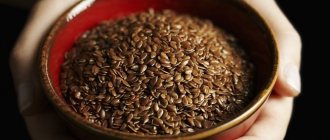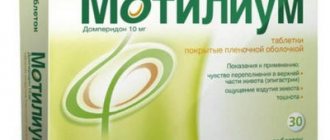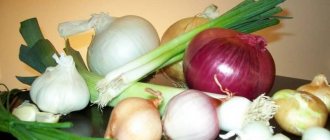The human stomach is subjected to a lot of stress every day, and often the digestive system malfunctions due to stomach diseases that require treatment. One of the natural medicines is flax seeds.
It is impossible not to pay attention to disruptions in the functioning of the stomach, because a sick stomach makes itself felt by changes in appetite, a constant feeling of thirst, belching and heartburn, dyspepsia, and pain. All these symptoms can occur with both gastritis and gastric ulcers. With gastritis, the secretory function of the stomach is disrupted, often accompanied by intestinal spasm, resulting in spastic constipation. Gastritis in a mild form is manifested by pain and appetite deviations; in a more advanced form, the absorption of substances necessary for humans (vitamins, macro- and microelements, amino acids) is impaired. Gastritis with high acidity is characterized by vomiting, nagging pain, belching and burning, and there is also a feeling of fullness in the stomach. Symptoms often appear, such as changes in blood pressure, changes in heartbeat, which are often accompanied by nervous system disorders (sleep disturbances, irritability, in some cases fatigue and drowsiness). The emerging symptoms of acute gastritis often do not always alert a person, so the acute form of the course becomes chronic.
The next most common stomach disease is peptic ulcer, which is most often the result of untreated gastritis or a hereditary predisposition in combination with provoking factors, which include constant overwork and lack of sleep, stress, bad habits (nicotine and alcohol), and poor diet. The symptoms of peptic ulcer are similar to those of gastritis, but there are differences. Stomach ulcers are characterized by so-called “hunger pains”, the pain is felt especially acutely at night, vomiting is accompanied by gastric bleeding, which exposes a person’s health to serious consequences.
If any of the symptoms indicating stomach disease appear, it is necessary to urgently take measures to obtain adequate treatment and follow a diet. For treatment and prevention, the use of flax seed for gastritis and stomach ulcers is of particular interest.
What are the benefits of flax seeds?
Flax is an annual plant, it is often used both in production and in medicine. When treating the gastrointestinal tract, only its seeds are used, since they contain a huge amount of various beneficial substances that have a positive effect on the mucous membrane. By using flaxseeds, you can get rid of such serious diseases as gastritis and ulcers.
They contain plant proteins, the structure of which is similar to soy protein, and are easily digestible. Flax seeds also contain a lot of polyunsaturated fatty acids, which help strengthen the immune system, which helps the body resist infections.
List of contraindications for taking semen
Treatment of gastritis with flaxseed is not suitable for everyone; medicine knows many contraindications to its use. There are exceptions here, since much depends on the individual characteristics of the patient. Therefore, before taking the product, be sure to consult with your doctor.
Typically, the seed is not recommended for:
- kidney and gallstones;
- acute forms of pancreatitis (inflammation of the pancreas) and cholecystitis;
- allergies to flax components;
- blood clotting disorders, because the product thins it;
- problems with the thyroid gland;
- early and late stages of pregnancy (possible miscarriage and premature birth, respectively);
- during breastfeeding (flax changes the structure of milk);
- other gastrointestinal disorders.
Remember that fiber improves metabolism, so during the course of treatment for gastritis you need to drink 2-3 liters of plain water per day.
Properties of flax seeds
They have a number of useful properties, namely they are:
- An excellent anti-inflammatory agent.
- An excellent pain reliever.
- Wound healing.
- Enveloping.
- The seeds have an anti-sclerotic effect.
- Thanks to them, motor and secretory function improves.
This wide range of properties makes flax seeds for gastritis with high acidity one of the most useful remedies in the fight against it. But not a single remedy can help the patient if he does not follow the correct therapeutic diet regimen.
How to take flax seeds and prepare a decoction
There are many ways to prepare various decoctions. Flax seeds are an irreplaceable medicine for gastritis with high acidity, but you need to prepare the decoction correctly. During its cooking, a certain mucus is formed, which is the main component. This film protects both damaged and healthy mucous membranes. In order to get the desired film when preparing a decoction of flaxseed for gastritis, you need to resort to the following methods:
- 1 tbsp. a spoonful of seeds is boiled in 200 g of water for 5 minutes, then this drink is allowed to stand for 2 hours. It is consumed shortly before eating, 1 tbsp. spoon 3 times a day.
- You need to take a pan overnight, pour 1 liter of boiling water and add 3 tbsp. tablespoons of flax seeds, then wrap with a towel and leave to infuse until the morning. It is necessary to take the decoction before meals 3 times a day, half a glass.
- For the next infusion of flax seeds for gastritis, you need to pour 70 g of them into a saucepan
- and pour 1 liter. water, cook for at least 2 hours, then strain and let sit until completely cooled. You need to take the prepared decoction an hour before meals (1 glass), and this use of this drink should continue for 2 months.
- The following recipe for flax seeds for gastritis differs in that you need to take chamomile flowers, bearberry leaves, thyme, coriander, tansy and, of course, flaxseed. All this must be poured with 0.5 liters of boiling water and left to infuse. You need to take the product for 60 days, 1/3 cup before meals every day.
During brewing, the seeds release their most beneficial substances into the liquid. If the required dosage is observed, the effect of this useful herbal remedy will begin to appear quite quickly. Much depends on how to prepare a decoction of flax seeds for gastritis.
Useful tips
- Flax seeds and seed oil should not be used by people with diagnosed inflammation of the ocular cornea.
- It is necessary to strictly observe the duration of each course of treatment: if you take flax as a remedy for a long time, sometimes an allergic reaction occurs, and disturbances in the functioning of the stomach are recorded.
- Seed oil should not be taken more than one tablespoon; it is a product that can cause serious poisoning.
- Flaxseed oil is a good choleretic agent; patients with gallstones should take it with caution.
In addition to using the above recipes, stomach ulcers are treated in another effective way. You need to mix flaxseed and chamomile flowers in equal proportions, prepare an infusion of the ingredients and take it for two months. An anti-inflammatory, soothing, bactericidal effect will be achieved. For intense pain in the abdomen, you can warm up flaxseeds and wrap them in cloth and apply them to the stomach area.
You can prevent the disease with flax seeds. You need to add seeds to dishes, to dough mixed for baking bread, to porridge in the morning. You can simply chew a small amount of seeds on an empty stomach with a glass of water.
Good protection for the stomach can be ensured by consuming the following oil mixture: flaxseed oil, St. John's wort oil, sea buckthorn oil, mix thoroughly and leave for two days. Take a tablespoon before meals. As a result of using the drug according to the prescription, the metabolism in the body improves.
Contraindications for the use of flaxseed
There is no doubt that in the treatment of peptic ulcers, such magic seeds often turn out to be indispensable, but each remedy has contraindications for use. Flax seeds are no exception. Contraindications include:
- Cholelithiasis;
- Cholecystitis;
- Intestinal obstruction;
- Pancreatitis;
- Hepatitis;
- Allergy or individual intolerance.
- Endometritis, polycystic disease.
- Uterine fibroid.
- Pregnancy and lactation.
- Inflammation in the intestines.
In the treatment of peptic ulcers, flaxseeds are allowed to be used in combination with herbs that have similar valuable properties.
Herbal infusions:
- flax seed combined with dandelion, plantain and burdock root;
- flax seed and sage, knotweed, clove, buckthorn;
- flax seed with wheatgrass and wheatgrass;
- flaxseed with blueberry leaves and St. John's wort.
Flax is a unique plant that includes important components: vegetable protein, fiber, vitamins and microelements. It copes with various diseases, including stomach ulcers and similar diseases of the digestive system.
Alternative methods
There are people for whom a decoction of flax seeds may not be suitable for gastritis with high acidity. There is another option for them - taking the seeds themselves. It is, of course, less effective, but if you consume liquid food and dairy products, the seeds can have the necessary positive effect. There are many ways to use it, but they will only be effective for atrophic gastritis. But still, experts recommend that people with this disease eat flax seeds.
Discussion
All those surveyed highly appreciated the organoleptic properties of “Medicinal porridge” according to the main criteria: appearance, smell, color, taste, consistency (from 8 to 10 points on a 10-point scale) and expressed a desire to use the product in the future.
The results of the study showed good tolerability and safety of dietary therapeutic and dietary preventive nutrition LEOVIT GASTRO “Oatmeal porridge with herbs and flax seed.” In patients taking the product, after 14 days there was a decrease in the number of complaints from the gastrointestinal tract. The reduction in pain in patients of the main group after 180 days confirms the analgesic effect after taking the product, which can be explained by the antispasmodic, enveloping, anti-inflammatory effect of the plant extracts included in its composition.
A study of general blood test indicators and biochemical parameters showed the absence of a toxic effect from taking “Medicinal porridge”. The normalization of glucose and cholesterol levels in patients of the main group in the dynamics of the study is logically explainable, since “Therapeutic porridge” does not contain quickly absorbed mono- and disaccharides, but contains dietary fiber, including inulin. A study of the dynamics of changes in protein metabolism revealed a decrease in the level of γ- and α-globulin fractions, which are markers of the acute phase of inflammation, which clearly correlated with the results of endoscopic examination and ultrasound data.
Benefits of flax seed decoction
Flax seeds are a healthy product, but a decoction of them is of particular value for people suffering from gastritis. Its use helps to get rid of pain, relieve inflammation of the mucous membrane, and most importantly, the decoction eliminates the cause of gastritis. It has a detrimental effect on bacteria called Helicobacter pylori, which cause the disease.
The seeds contain vital elements that the intestines and stomach cannot do without. The whole body benefits from taking it. Flax seeds contain a large amount of:
- Proteins.
- Polysaccharides.
- Fatty acids.
- Vitamins.
- Selena.
- Lecithin.
- Fiber.
A decoction of flax seeds for gastritis, according to doctors, is the optimal medicine. Thanks to it, the mucous membrane recovers much faster. Even if treatment is carried out with medication (and this should be mandatory in any case), it should be taken as an additional remedy.
The essence of stomach disease
To understand how flaxseed works to treat gastritis, you need to understand what the essence of the disease is. Pain in the stomach intensifies if a person has eaten food that is “unsuitable” for a sick stomach. This is spicy, fatty, sour, too hot or too cold food. If a patient with this diagnosis smokes, drinks alcoholic beverages, often overeats, suffers from eating disorders (poisoning), experiences nervous overload and stress, then gastritis will often make itself felt.
Gastritis is a disease in which the acid balance is disrupted under the influence of special bacteria. Hydrochloric acid, which is involved in digestion, destroys the gastric mucosa, causing unpleasant symptoms. A person feels pain in the stomach, he is tormented by belching, heartburn, nausea, and bowel movements are disturbed.
The task of traditional therapy and traditional medicine is to relieve inflammation of the mucous walls of the stomach and prevent repeated relapses of the disease. This folk remedy will help with this. Flaxseed cocktail for gastritis will protect the gastric mucosa from the aggressive effects of hydrochloric acid.
Rules for taking the decoction
How to take flax seeds in the form of a decoction so that it brings greater benefits? It must be consumed strictly following the recipes, but they must be proven. Those who are planning to use this natural remedy to treat gastritis with high acidity need to know that it is used as an auxiliary, but very effective treatment. It can also be taken for preventive purposes.
Treatment of such a serious disease cannot be done without drug intervention, so at the first signs of the disease you need to urgently consult a specialist so as not to harm yourself.
When brewing an infusion of flax seeds for gastritis, you need to know that a substance similar to mucus is released from them, it enters the stomach and envelops the mucous membrane, thus eliminating inflammation and protecting against any other negative effects of various factors.
If you brew it incorrectly and take flax seeds for gastritis with high acidity, there will be no effect, since the mucus necessary for treatment is not formed, and it is the main component in treating the stomach.
Methods for preparing flaxseed oil
To obtain oil from flax seeds, 2 methods are used.
Of course, you can buy oil in the store. However, it is best to prepare it yourself from flax seeds.
Only in this case will you achieve ideal product quality. To obtain natural oil, 2 methods are used:
- The hot method consists of pouring 100 grams of seeds into 100 ml of water. Within an hour, the seeds should swell. After this, they are transferred to a heated cast-iron frying pan and fried over low heat for an hour. The lid must be closed during cooking. When frying, juice should come out of the seeds, which is oil. It needs to be filtered and poured into a separate container.
- The cold method is considered the most effective. The finished raw material must be ground and placed in a piece of gauze. Hang the raw materials over a separate container and apply pressure. Under pressure, the oil will begin to flow into the container. Pour the finished product into a glass jar.
Product features and contraindications
Although flax seeds are a very healthy product, there are still some categories of people who are not recommended to take them:
- This should especially not be done by those who have problems with the gallbladder, for the reason that the seeds have a choleretic effect.
- Due to the fact that the seeds contain a lot of fiber, doctors recommend that when taking them, increase the amount of liquid you drink during the day. Thanks to water, fiber will be absorbed much better, and your stomach will not bloat as often.
- It is not recommended for pregnant women, since the effect of this plant on their body has not yet been fully studied.
- It is necessary not to exceed the daily norm of 50 g. The effect of a large amount of consumed fiber on the human body has not yet been fully studied by scientists.
- Flax seeds should not be given to children under 3 years of age. Flax is even recommended for older people; it perfectly helps improve the functioning of the children's digestive system and even helps in the fight against chronic diseases.
Flax seeds are an excellent method for treating diseases such as gastritis. But the plant has not been thoroughly studied, for this reason healing should be carried out with some caution. It must be taken in moderation, then the effect of use will be noticeable.
results
The results of the examination of 14 patients in the main group and 10 patients in the comparison group are presented in the table .
The main nosological forms in patients included in the study.
The dynamics of complaints from patients (in%) of the main group and the comparison group before the study, 14 and 180 days after the start of diet therapy is presented in Fig. 2 .
Rice. 2. Dynamics of complaints after 14 and 180 days, as a percentage of the initial level. main - main group;
gr sr—comparison group. 14 days after starting to use “Medicinal porridge,” complaints of lack of appetite decreased in 9 (64.3%) patients of the main group. They also noted a decrease in discomfort, epigastric heaviness and nausea. Particularly noticeable was the disappearance of spastic pain in the epigastrium. Similar symptoms in patients in the comparison group remained without significant changes.
After 180 days of taking “Medicinal porridge,” 100% of patients in the main group noted positive dynamics, expressed by the absence of heartburn, belching, nausea, pain in the right hypochondrium and epigastric region, and rumbling in the abdomen. In all patients, stool and appetite normalized. The frequency of pain syndrome in patients of the main group decreased from 92.8 to 7%, while in patients of the comparison group this figure reached only 40%.
The data obtained confirm the analgesic effect as a result of taking the product, which can be explained by the antispasmodic, enveloping, anti-inflammatory effect of the plant extracts included in its composition. Positive dynamics of the above symptoms were also observed in patients in the comparison group, but to a significantly lesser extent (see Fig. 2) .
During the entire observation period (180 days), all patients of the main group, while taking a specialized product, had no signs of exacerbation of any pathology of the gastrointestinal tract, and there were no allergic reactions.
According to the results of endoscopic examination, 180 days after the start of the study, 93% of patients in the main group retained signs of stable remission of existing diseases of the stomach and duodenum, while inflammatory phenomena were absent only in 60% of patients in the comparison group. Healing of erosions and scarring of ulcers were more pronounced in patients of the main group.
According to ultrasound data, after 180 days of taking “Medicinal porridge”, in 4 patients of the main group who had diseases of the gallbladder, it was noted to decrease to normal size, pain when pressed with a sensor in the area of the projection of the gallbladder decreased, and there was no thick bile in the lumen of the bladder. Gas formation decreased significantly in most patients.
The results of studies of a general clinical blood test 180 days after the start of therapy did not reveal statistically significant changes in patients of both groups. The results of the analysis of changes in biochemical parameters showed that the concentration of bilirubin in the blood of patients in the main group decreased by 16.7%. In patients of the main group, there was a decrease in the blood concentration of the main enzymes (AlAT and AST), which characterize the functional activity of the liver, by 8 and 14.8%, respectively. However, there were no statistically significant changes in patients in the comparison group. There was a statistically significant decrease in GGT content after 180 days of taking the product from 20.29±0.28 to 18.57±0.41 U/l (p=0.015). Diet therapy using “Medicinal porridge” contributed to the normalization of blood glucose levels; a decrease was observed from 5.96±0.10 to 5.09±0.10 mmol/l (p=0.011). A decrease in cholesterol levels was also found from 6.08±0.13 to 5.42 mmol/l (p=0.103).
When analyzing changes in the indicators of protein fractions, a decrease in the level of protein markers of inflammation γ-, α-1 and α-2 globulins was noted, which is presented in Fig. 3 .
Rice. 3. Dynamics of indicators of the acute phase of inflammation in patients of the main group and the comparison group before the study, after 14 and 180 days. * — p<0.05. main - main group; gr sr—comparison group.
Prevention of gastritis with flax seeds
To prevent a disease such as gastritis from appearing, you need to carry out prevention with flax seeds; they can be taken daily. It must be added to various foods, to salads, both vegetable and fruit, and even to baked goods. Before use, the seeds need to be dried; their digestibility will be much better. Here are some recipes.
You need to heat the frying pan and remove it from the heat, pour in the required amount of seeds, and stir them, this process should last several minutes. After this manipulation, you need to crush them and add a little salt. Everything that comes out is mixed with pre-chopped onions and served most often with potatoes.
Sweets are also made from flaxseeds. To do this, take 150 g of seeds and 2 tbsp. spoons of honey. For sweets you will need to make a powder from the following ingredients:
- Coconut flakes.
- Powdered sugar.
- Sesame.
- Cocoa.
- Cinnamon.
You need to grind the seeds well in a blender and add honey, mix and make balls. After this, roll them in the resulting powder.
How do flax seeds fight gastritis?
When acidity is elevated, the walls of the mucous membrane become irritated due to the release of too much hydrochloric acid. Consumption of flax seeds normalizes the secretion of gastric secretions, while erosive formations heal. In addition, flax helps improve digestive processes in the stomach and also relieves heartburn, which is very important for patients with gastritis.
Various sensations of discomfort in the abdomen, such as colic, excessive gas formation, occur due to incompletely digested food, because the secretion of gastric juice is impaired. Much depends on how to brew flax seeds for gastritis, this is of great importance. They normalize digestion and are an excellent medicine and means of prevention. Do not underestimate this product; its medicinal properties have been known for a long time, and people have been using it for a long time. Flax is used for various diseases; it has many beneficial properties.
What to do if you have low acidity?
Flaxseed decoction will help with low acidity.
A person suffering from low acidity experiences no less trouble. The food simply does not have time to be digested in the stomach.
The mass not completely processed by enzymes enters the intestines. A patient with such disorders experiences stagnation in the intestines. Food begins to rot and poison the entire body.
To stop the processes of rotting and fermentation, you can use flaxseed decoction. After completing a course of treatment, a person’s gas production decreases and belching with a putrid odor disappears.











